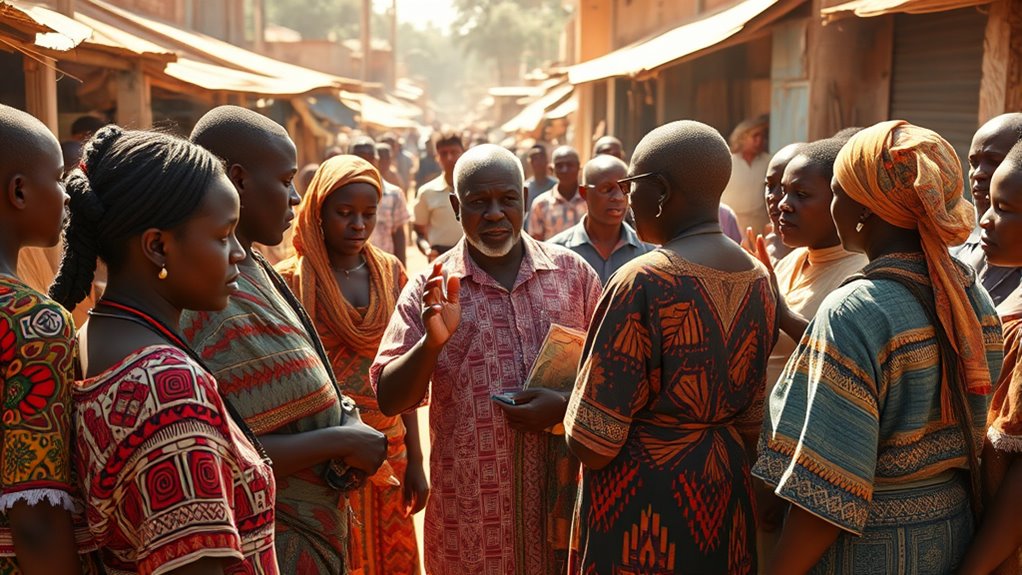Shona to English translation in Zimbabwe facilitates essential communication across cultural and professional spheres, drawing on the language’s phonetic, tonal, and grammatical features. Techniques prioritize direct conversions while adapting proverbs and idioms for natural flow. Professional services in cities like Harare provide certified experts and tools, such as AI platforms and dictionaries, to guarantee accuracy in sectors like education and healthcare. Benefits include global opportunities and cultural exchange. Subsequent details reveal more on practical uses and enhancements in Africa.
Quick Summaries
- Professional Shona to English translation services are widely available in Zimbabwe, particularly in cities like Harare and Bulawayo.
- Certified linguists in Africa specialize in accurate Shona-English conversions, preserving cultural nuances and tonal elements.
- Advanced tools, such as machine translation and bilingual dictionaries, enhance efficiency in Shona to English translation processes.
- Translation services support key sectors in Zimbabwe and Africa, including education, healthcare, and business for better accessibility.
- Benefits include fostering cultural exchange and economic opportunities through reliable Shona-English language bridges.
The Basics of Shona Language

The Shona language, a Bantu language primarily spoken in Zimbabwe, encompasses fundamental elements such as its phonetic structure, tonal system, and basic grammar rules, which are essential for accurate translation to English.
Shona’s phonetic structure features a simple inventory of consonants and vowels, including clicks and aspirated sounds, making pronunciation distinct from English. For instance, it uses five vowel sounds that are generally pure and not diphthongized. The tonal system is vital, with high and low tones altering word meanings; a single word can shift significance based on pitch patterns. Basic grammar includes noun classes, where prefixes indicate categories like singular or plural, and verbs conjugate based on subject and tense. This agglutinative nature allows words to combine affixes for complex expressions. Understanding these elements provides a foundation for linguistic analysis, highlighting Shona’s rich cultural heritage in Southern Africa.
Shona Translation Techniques

Shona translation techniques play an essential role in accurately conveying Shona texts to English. Literal techniques emphasize direct word-for-word conversion to preserve original structures. Idiomatic approaches adapt expressions to achieve natural and culturally appropriate English equivalents.
Literal Techniques
Literal translation techniques in Shona to English involve direct word-for-word conversion, prioritizing the original text’s structure to preserve meaning while minimizing interpretive alterations. This method adheres closely to Shona’s grammatical framework, such as its noun classes and verb conjugations, ensuring that the English rendition mirrors the source’s syntactic order. For instance, Shona sentences often feature subject-verb-object arrangements that translators replicate directly, avoiding rephrasing to maintain fidelity. In fields like legal documents or technical manuals, this approach minimizes errors by retaining precise terminology, such as translating “mudzimu” as “ancestor spirit” without embellishment. However, challenges arise with Shona’s agglutinative nature, where words combine morphemes, potentially leading to awkward English phrasing. Despite this, literal techniques enhance clarity in straightforward contexts, fostering reliable cross-cultural communication without altering intent. Overall, they serve as a foundational tool in translation practices.
Idiomatic Approaches
Idiomatic approaches in Shona translation prioritize adapting cultural nuances and expressions to achieve natural fluency in English, contrasting with literal methods by focusing on equivalent idioms rather than direct word conversions. Translators identify Shona proverbs, like “Mudzimu haurumwi,” which equates to the English “You can’t teach an old dog new tricks,” to preserve intended meanings and emotional resonance. This technique guarantees the translated text resonates with English-speaking audiences, avoiding awkwardness from word-for-word renditions. By drawing on cultural parallels, such as Shona folklore in everyday speech, idiomatic translation fosters deeper understanding and authenticity. Experts emphasize its role in literature and media, where maintaining idiomatic integrity enhances engagement. Ultimately, this method bridges linguistic divides, promoting effective cross-cultural communication in Zimbabwe’s diverse contexts. (124 words)
Professional Translation Services in Zimbabwe

In Zimbabwe, professional translation services have emerged as essential facilitators for accurate Shona-to-English conversions, supporting sectors like business, education, and government. These services rely on certified linguists with expertise in both languages, guaranteeing precision in cultural contexts and technical accuracy. For instance, businesses utilize them for marketing materials and legal contracts, while educational institutions depend on them for curriculum development and research. Government agencies employ these experts to handle official communications, fostering better public services. The growth of such services has been driven by Zimbabwe’s increasing global interactions, with firms in Harare and Bulawayo offering rapid, high-quality deliverables. Quality assurance processes, including proofreading and cultural reviews, maintain reliability, making these services indispensable for effective cross-language communication. As demand rises, ongoing training for translators guarantees adaptability to evolving linguistic needs.
Common Shona Words and Phrases
The subtopic of common Shona words and phrases explores essential language elements for learners. Basic Shona vocabulary includes fundamental words that build foundational knowledge. Useful Shona phrases provide practical expressions for daily interactions.
Basic Shona Vocabulary
Shona vocabulary forms the foundation for effective communication in this Bantu language, encompassing everyday words and phrases such as greetings, numbers, and basic expressions used in Zimbabwe and surrounding regions. Understanding these elements aids learners in grasping cultural nuances and daily interactions. For instance, basic words cover family, objects, and simple descriptors, promoting cultural exchange. This vocabulary is essential for beginners, facilitating smoother language acquisition without complex structures.
| Shona Word | English Translation |
|---|---|
| Mhuri | Family |
| Imi | You (plural) |
| Nhamba | Number |
| Dzakwana | Good |
| Zvazvo | Therefore |
Useful Shona Phrases
Beyond basic vocabulary, everyday Shona phrases enable practical communication for learners engaging in Zimbabwean interactions. These phrases span greetings, inquiries, and polite exchanges, facilitating smoother daily conversations. For instance, “Mhoro” means Hello, while “Masikati” signifies Good afternoon, essential for social encounters. Expressions like “Ndinofara kukuziva” (Nice to meet you) and “Unofamba sei?” (How are you?) foster rapport and build relationships. In practical settings, shopping phrases such as “Ndoda iyi” (I want this) and “Inguva iyi?” (How much is this?) aid transactions. Polite terms like “Ndapota” (Please) and “Ndatenda” (Thank you) promote respect. Farewells, including “Sariwa” (Goodbye), guarantee courteous endings. Mastering these phrases enhances cultural understanding, allowing learners to navigate Zimbabwean contexts with confidence and precision.
Cultural Aspects of Shona Translation
Cultural nuances profoundly shape the fidelity of Shona translations, requiring translators to navigate traditions, idioms, and societal contexts for accurate conveyance. In Shona culture, proverbs like “Chara chimwe hacho” (One finger cannot kill a louse) encapsulate communal values that lose depth in literal English renditions, demanding adaptive strategies to preserve intent. Translators must grasp Zimbabwe’s historical influences, such as colonial legacies and indigenous beliefs, which infuse language with layered meanings. For instance, kinship terms reflect hierarchical respect, where direct equivalents may overlook subtleties of age and status. This cultural immersion guarantees translations avoid misinterpretation, maintaining the essence of Shona storytelling and rituals. Ultimately, effective translation bridges linguistic divides by honoring these elements, fostering genuine cross-cultural understanding without altering core narratives.
Benefits of Shona to English Conversion
The conversion of Shona to English enhances global accessibility, enabling speakers to engage with broader audiences and resources. This linguistic bridge opens educational pathways, allowing individuals to access international curricula, research, and online platforms that were previously out of reach. In professional spheres, it facilitates career advancement by enabling participation in global job markets and collaborations, where English predominates. Furthermore, it empowers cultural preservation, as Shona speakers can share traditions, stories, and knowledge with English-dominant communities, fostering mutual respect and dialogue. By breaking language barriers, this conversion also supports personal development, improving cognitive skills and adaptability in a multilingual world. Ultimately, it strengthens social and economic integration, benefiting both individuals and communities in Zimbabwe and beyond.
Tools for Accurate Translations
Various tools, such as machine translation software and bilingual dictionaries, play an essential role in ensuring precise Shona to English conversions. Machine translation software, powered by advanced algorithms, offers rapid initial drafts but requires refinement to handle Shona’s tonal nuances and idiomatic expressions accurately. Bilingual dictionaries provide essential word-level accuracy, including phonetic guides and contextual examples, aiding translators in avoiding common pitfalls like false cognates. Additionally, specialized glossaries and translation management systems enhance consistency by maintaining terminology databases tailored to Shona-English pairs. Professional editors often integrate these tools with human expertise to refine outputs, minimizing errors in grammar and cultural subtleties. Emerging AI-driven platforms further improve accuracy through machine learning, adapting to user corrections for better future translations. Ultimately, combining these resources fosters reliable linguistic bridges in translation workflows.
Real-World Applications in Africa
Shona-English translation tools apply extensively across African sectors, enhancing communication in education, healthcare, and business. These tools bridge linguistic divides, fostering inclusivity and efficiency in diverse environments. By converting Shona content into English, they support cross-cultural interactions and knowledge sharing, particularly in Zimbabwe and neighboring regions.
- Education: They translate textbooks and online courses, enabling wider access for Shona-speaking students and improving literacy rates.
- Healthcare: Tools assist in translating medical instructions and patient histories, ensuring accurate diagnoses and better health outcomes in rural clinics.
- Business: In trade, they facilitate contract negotiations and marketing materials, boosting economic ties with English-dominant partners.
- Government Services: They aid in official documents and public announcements, promoting civic engagement and equitable policy implementation.
Frequently Asked Questions
How Much Does Shona Translation Cost?
The cost of Shona translation varies depending on factors like text length, complexity, and translator expertise. Rates typically range from $0.05 to $0.20 per word, influenced by market demands and service providers’ experience in linguistic services.
What Is the Typical Turnaround Time?
The typical turnaround time for translation projects varies based on factors like document length and complexity. Standard services often deliver simple texts within 24 to 48 hours, while extensive assignments may require three to seven business days for accuracy.
Are Translators Certified in Zimbabwe?
Translators in Zimbabwe can obtain certification through bodies like the Zimbabwe Institute of Translators and Interpreters. While not mandatory, certification enhances credibility and guarantees professional standards in the industry, varying by individual commitment.
Can I Request Rush Translation Services?
Requesting rush translation services is feasible for clients needing urgent documents translated. Professional agencies often accommodate such requests, typically with extra fees based on urgency and workload. It is advisable to inquire directly for availability and terms.
How Do I Verify a Translator’s Credentials?
Verifying a translator’s credentials is essential for ensuring reliable services. This process involves checking certifications from recognized bodies, reviewing educational qualifications, examining professional experience, contacting references, and evaluating sample translations for quality and accuracy.



